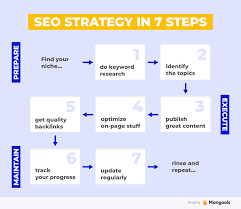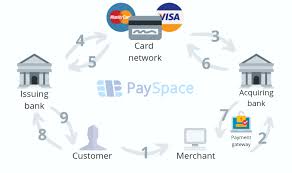The Ultimate Guide to SEO: Step by Step
Search Engine Optimization (SEO) is crucial for improving your website’s visibility and ranking on search engine results pages. By following these steps, you can enhance your SEO strategy and attract more organic traffic to your site.
Step 1: Keyword Research
Start by identifying relevant keywords that your target audience is searching for. Use tools like Google Keyword Planner or SEMrush to discover high-volume keywords with low competition.
Step 2: On-Page Optimization
Optimize your website’s content, meta tags, headings, and images with the selected keywords. Ensure that your content is high-quality, relevant, and engaging for both users and search engines.
Step 3: Technical SEO
Improve your website’s technical aspects, such as site speed, mobile-friendliness, URL structure, and XML sitemap. Fix any broken links or errors that may hinder search engine crawling and indexing.
Step 4: Off-Page SEO
Build high-quality backlinks from reputable websites to increase your site’s authority and credibility. Engage in guest blogging, social media promotion, and influencer outreach to expand your online presence.
Step 5: Monitoring and Analysis
Regularly monitor your website’s performance using tools like Google Analytics and Google Search Console. Track key metrics such as organic traffic, keyword rankings, bounce rate, and conversion rates to measure the effectiveness of your SEO efforts.
Step 6: Continuous Improvement
SEO is an ongoing process that requires constant monitoring and optimization. Stay updated on industry trends and algorithm changes to adapt your strategy accordingly. Test different tactics and strategies to find what works best for your website.
By following these steps diligently and consistently refining your SEO approach, you can boost your website’s visibility, drive more organic traffic, and achieve higher search engine rankings.
9 Essential Step-by-Step SEO Tips to Boost Your Website’s Visibility
- Perform keyword research to identify relevant search terms for your website.
- Optimize your website’s meta tags, including title tags and meta descriptions.
- Create high-quality, original content that is valuable to your target audience.
- Optimize your website’s images by using descriptive filenames and alt text.
- Improve your website’s loading speed for better user experience and SEO performance.
- Build internal links within your website to improve navigation and spread link equity.
- Obtain backlinks from reputable websites to increase your site’s authority and credibility.
- Utilize social media platforms to promote your content and engage with your audience.
- Regularly monitor and analyze your SEO performance using tools like Google Analytics.
Perform keyword research to identify relevant search terms for your website.
Performing keyword research is a crucial first step in any successful SEO strategy. By identifying relevant search terms that your target audience is using, you can optimize your website’s content to align with these keywords and improve your chances of ranking higher in search engine results. Understanding the language and phrases that potential visitors are using allows you to tailor your content to meet their needs and preferences, ultimately driving more organic traffic to your site.
Optimize your website’s meta tags, including title tags and meta descriptions.
Optimizing your website’s meta tags, such as title tags and meta descriptions, is a crucial step in improving your SEO strategy. Title tags provide a concise and descriptive overview of each webpage’s content, helping search engines understand the relevance of your site to users’ queries. Meanwhile, meta descriptions serve as a brief summary that entices users to click on your link in search results. By crafting compelling and keyword-rich meta tags, you can enhance your website’s visibility, attract more organic traffic, and improve your click-through rates, ultimately boosting your overall search engine rankings.
Create high-quality, original content that is valuable to your target audience.
Creating high-quality, original content that offers value to your target audience is a fundamental aspect of a successful SEO strategy. By producing relevant and engaging content, you not only attract and retain visitors to your website but also establish credibility and authority in your industry. Search engines prioritize websites that provide valuable information to users, so focusing on creating content that addresses the needs and interests of your target audience can significantly improve your search engine rankings and overall online visibility.
Optimize your website’s images by using descriptive filenames and alt text.
Optimizing your website’s images is a crucial step in improving your SEO strategy. By using descriptive filenames and alt text for your images, you can provide valuable context to search engines about the content of the image. This not only enhances the accessibility of your website for visually impaired users but also helps search engines understand the relevance of your images to the overall content of your site. Incorporating relevant keywords into your image filenames and alt text can further boost your website’s visibility in search engine results pages, ultimately driving more organic traffic to your site.
Improve your website’s loading speed for better user experience and SEO performance.
Improving your website’s loading speed is a crucial step in enhancing user experience and boosting SEO performance. A fast-loading website not only keeps visitors engaged and satisfied but also signals to search engines that your site is reliable and user-friendly. By optimizing your website’s loading speed through techniques like image compression, minifying CSS and JavaScript files, and leveraging browser caching, you can create a seamless browsing experience for users while improving your site’s chances of ranking higher in search engine results pages.
Build internal links within your website to improve navigation and spread link equity.
Building internal links within your website is a crucial step in enhancing your SEO strategy. By strategically linking relevant pages to each other, you not only improve navigation for users but also spread link equity throughout your site. This helps search engines understand the structure of your website better and can positively impact your search rankings. Internal linking also encourages visitors to explore more of your content, increasing engagement and ultimately driving more traffic to key pages on your site.
Obtain backlinks from reputable websites to increase your site’s authority and credibility.
Obtaining backlinks from reputable websites is a crucial step in enhancing your site’s authority and credibility in the eyes of search engines. Backlinks act as “upvotes” for your website, signaling to search engines that other trustworthy sites vouch for your content. By earning backlinks from high-quality sources, you not only improve your site’s visibility in search results but also establish your website as a reliable and valuable resource within your industry. This strategy can help boost your rankings, drive more organic traffic, and ultimately lead to greater online success.
Utilize social media platforms to promote your content and engage with your audience.
Utilizing social media platforms is a crucial step in your SEO strategy. By promoting your content and actively engaging with your audience on platforms like Facebook, Twitter, Instagram, and LinkedIn, you can increase brand awareness, drive traffic to your website, and improve your search engine rankings. Sharing valuable content, responding to comments and messages, and participating in conversations within your industry not only enhance your online presence but also establish credibility and trust with your target audience. Social media engagement plays a significant role in boosting your SEO efforts and building a strong online community around your brand.
Regularly monitor and analyze your SEO performance using tools like Google Analytics.
Regularly monitoring and analyzing your SEO performance using tools like Google Analytics is essential for understanding the effectiveness of your optimization efforts. By tracking key metrics such as organic traffic, keyword rankings, user behavior, and conversion rates, you can gain valuable insights into what is working well and where improvements are needed. This data-driven approach allows you to make informed decisions and adjustments to your SEO strategy, ultimately helping you achieve better results and maximize the impact of your online presence.




